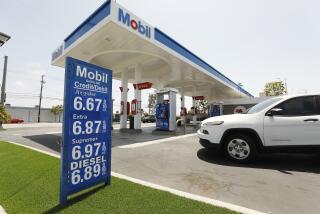EARTHWATCH : It’s a Natural : Natural gas, a cleaner, cheaper and plentiful auto fuel, is on the comeback road.
This is a story about a nuisance that turned out to be nice. When Unocal, the oil giant, was founded in Santa Paula at the turn of the last century, drillers digging for liquid petroleum found it to be a nuisance when they’d come up with natural gas instead. Visit the oil museum, in the building in Santa Paula where Unocal was founded, and you will see they were definitely not interested in “town gas,” as it was called then.
But eventually Unocal discovered a market for the natural gas it found trapped in its oil patches hereabouts and on the Gulf Coast.
Now we get to the part everyone knows about. They decided to pipe it into town for cooking and heating and added stinky fragrance so we could tell when this odorless substance was leaking. End of story? No.
What Unocal knew then, and decided to talk about just last month, is that natural gas is as good a fuel for cars as the liquid kind.
As long ago as the Lincoln Administration, internal combustion engines were being run on town gas. Then, in 1866, the Germans tried refined liquid petroleum and wrote a lot of books about it. When Americans started tinkering with automobiles in the 1890s, we too went “wet,” so to speak.
In the intervening century this choice has cost us dearly. Now we’ve come full circle--back to Unocal in Ventura County and natural-gas-powered transportation.
What the company is talking about now is a string of gas stations that offer natural gas in compressed liquid form for pumping into specially modified cars or trucks. Why? Because compared to gasoline, it’s half the price at the pump, half as polluting and 100% American. (We are the Arabia of natural gas reserves.)
Unocal has a deal with Southern California Gas Co., the folks who pipe the stuff in from natural gas fields to all our houses. The gas will be flowing through the pumps at selected Unocal service stations in Los Angeles and Santa Barbara this year, and next year in Ventura.
The gizmo that compresses natural gas into liquid is expensive for the station operator--more than $100,000 for the industrial-strength model--and the number of California vehicles so far converted to use the fuel is small. Most of these are fleet vehicles, such as buses and delivery trucks, that currently operate out of motor pools, where they can be fueled from a compressor and pump owned by the fleet operator. The gas company estimates that half the fleets in California will be powered by natural gas in 10 years--even police cars.
The California Air Resources Board has mandated stricter clean air standards for next year (that ratchet upward again in subsequent years). Unocal and car makers think these standards can be met by “going natural.” Reformulated gasoline and methanol are fuels also being studied by the CARB and the California Energy Commission.
Tonight in Hollywood, the Environmental Communications Office, a group of environmentally conscious media execs, stars and writers, are meeting with Southern California Gas, Greenpeace, Friends of the Earth and the U.N. to probe the matter. Television producer Paul Haggis is urging ECO members to purchase and drive natural-gas-powered vans. (Home compressor installations typically cost about $2,000; van conversions, $3,000.) Huntington Beach conversion expert Bruce Eikelberger’s own ’75 Dodge van has logged 350,000 miles since he switched to natural gas. In the future, according to Eikelberger, “just as we used to go out to the movies and the gas station, now we can have both piped to our home.”
Meanwhile, back here between Ventura and Santa Barbara, we can do our own bit for environmentally benign travel by getting on the new Clean Air Express. That’s the natural gas bus service set to start operating between Ventura’s Government Center and Santa Barbara in two weeks.
Marsha Seacord, district manager of the gas company, convened vehicle fleet operators in Ventura County last week to quell fears that this form of fuel is dangerous. She showed them a video featuring converted vehicles dropped from condo roofs, blown up with dynamite and shot at with pistols. Not so good for the paint jobs, but the gas cylinders came through unscathed, like the legendary “black box” in an airplane.
It even turns out that Disneyland is into natural gas transportation--and not just in Fantasyland. Twenty years ago they switched to “natural” on all the rides, including the jungle boats, because gasoline fumes and Diesel noise were affecting both patrons and workers. Now natural gas even powers the submarines.
* FYI
* Clean Air Express bus, 963-3355.
* Home or fleet compressor, Southern California Gas Co., (213) 689-2991; Fuel Maker Corp., 801-530-2417.
* Vehicle conversion, IMPCO, (213) 630-5768; Windlord Performance Products, (714) 842-3017; Natural Gas Vehicle Coalition, (703) 527-3022.
More to Read
Sign up for Essential California
The most important California stories and recommendations in your inbox every morning.
You may occasionally receive promotional content from the Los Angeles Times.










